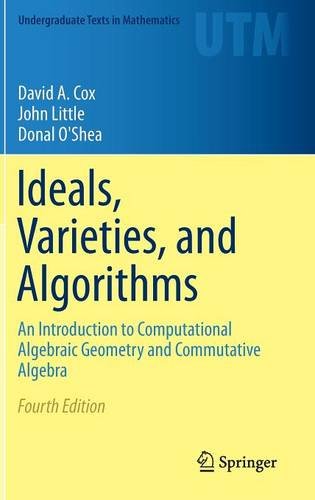 Ideals, Varieties, and Algorithms
Ideals, Varieties, and AlgorithmsFourth Edition, 2015
Springer
 Ideals, Varieties, and Algorithms
Ideals, Varieties, and Algorithms
With the publication of the 5th edition of Ideals, Varieties, and Algorithms, this page is not being updated and the links are not to be trusted.
For information about the 5th edition or questions about solutions for the 4th edition, go to the website idealsvarietiesalgorithms.org
This book is an introduction to computational algebraic geometry and commutative algebra at the undergraduate level. It discusses systems of polynomial equations ("ideals"), their solutions ("varieties"), and how these objects can be manipulated ("algorithms").
In 2016, Ideals, Varieties, and Algorithms was awarded the Leroy P. Steele Prize for Mathematical Exposition by the American Mathematical Society. The article The Story of Ideals, Varieties, and Algorithms tells how the book came to be written.
The fourth edition was originally published in 2015. A corrected publication appeared in 2018.
Lists of typographical errors are available for the third edition. There are two lists, depending on which printing you have. Because of the fourth edition, the typo list for the third edition is no longer being updated.
To find out which printing you have, check the second line from the bottom on the copyright page; the last digit displayed is the printing number. If you have the first printing, you will need to download both lists; if you have the second printing, you only need the second.
Lists of typographical errors are available for the second edition. Because of the fourth edition, the typo list for the second edition is no longer being updated.
There is a separate list for each printing. To find out which printing you have, check the second line from the bottom on the copyright page; the last digit displayed is the printing number.
Lists of typographical errors are also available for the first edition. Because of the fourth edition, the typo list for the first edition is no longer being updated.
There is a separate list for each printing. To find out which printing you have, check the third line from the bottom on the copyright page; the last digit displayed is the printing number.
A complete solutions manual for Ideals, Varieties, and Algorithms has been written up by David Cox and Ying Li of St. Francis University.
The solutions are not posted here because having open access to the solutions would diminish the value of the text. Ideals, Varieties, and Algorithms is a book where you learn by doing. If you are teaching from Ideals, Varieties, and Algorithms or are studying the book on your own, you may obtain a pdf copy of the solutions by sending email to jlittle@holycross.edu.
The book describes the computer algebra systems Maple, Mathematica and Sage in some detail. Maple and Mathematica are commercial products, while Sage is freely available. at
In addition, here are some other computer algebra programs which can do Gröbner basis calculations: Of these, all are free except for Magma.Click here for the web page for our book Using Algebraic Geometry. This book is an introduction to Gröbner bases and resultants, which are two of the main tools used in computational algebraic geometry and commutative algebra. It also discusses local methods and syzygies, and gives applications to integer programming, polynomial splines and algebraic coding theory. The second edition was published by Springer in the summer of 2005. It is available in both hardcover and paperback.
The catalog entry for Ideals, Varieties, and Algorithms in the Springer on-line catalog contains a brief description of the book and also includes ordering information.
You can contact the authors at the following email addresses:
dacox@amherst.edu jlittle@holycross.edu donalboshea@gmail.com